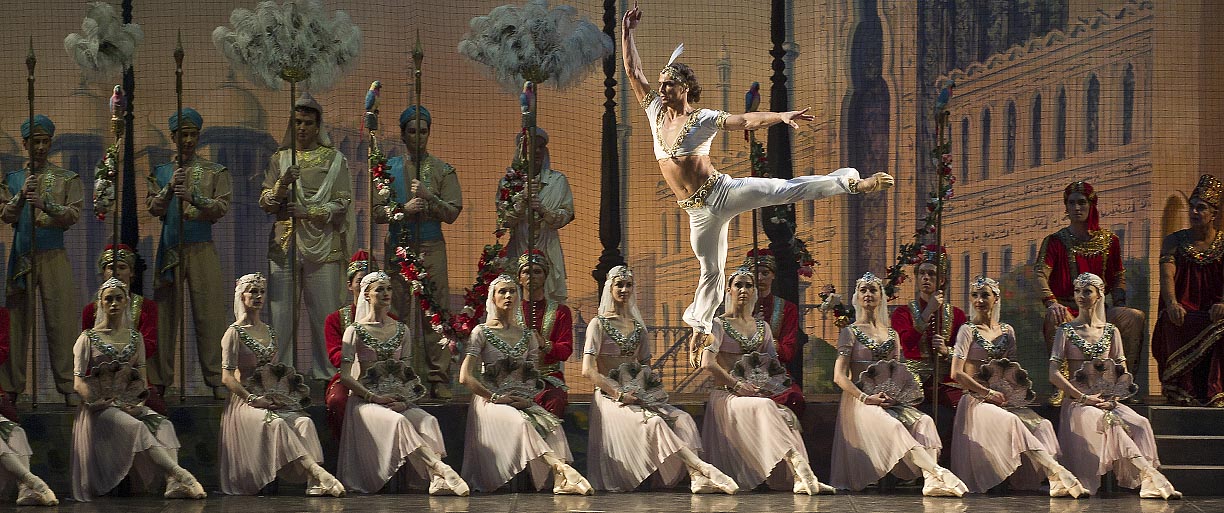According to Kommersant newspaper, Polina Semionova’s performance in La Bayadère displays “the astute mastery of character development as well as reciprocation of her stage partners’ emotional cues, a skill hard to come by in modern theatre”. Polina Semionova, Leonid Sarafanov, and Marat Shemiunov have forged a magnificent trio.
La Bayadère
ballet in three acts
music by Ludwig Minkus
Premiere of the production at the Mikhailovsky Theatre: 21 October 2000
Premiere of the revised revision: 15 February 2012
La Bayadère brings together all the widespread perceptions of India in the 19th century — a country of fakirs, lotuses, and snake charmers. The main characters are a devadasi, or temple dancer, and a gallant warrior, whose love is destroyed by the will of a powerful raja. However, the appeal of the ballet, which had its beginnings on the Russian Imperial stage, does not just lie in its oriental exoticism, fiery dances, fake elephants and tigers or solemn priests. The enchanting feature of the ballet is the magical contrast between the bustle of lavish festivities and the lofty aloofness of the famous Kingdom of the Shades, whose gentle melancholy is unequalled in its level of poetic synthesis.
The traditional version that has taken shape in the 140 years since the ballet was first performed requires a combination of refined, impeccable, academic dance and a subtle psychological interpretation of the role, with a strong individual acting talent. Today the production is a symbol of the permanence and continuity of the Russian ballet school’s traditions and continues to be one of the highest achievements in choreography.
Scene 1
The holy woods in front of the pagoda. Young noble warriors return from tiger hunting. The rich Kshatriya Solor, the renowned warrior, appears with a bow in his hand. He orders the warriors to leave him on his own at the holy fire. Solor asks the fakir Magedaveya to find an opportunity to talk to the beautiful Nikiya, the bayadère, who lives in the temple, and tell her that he’ll be waiting for her at the pagoda at night. Solor leaves.
The ceremonial arrival of the High Brahman, priests and bayadères, the temple dancers, heralds the beginning of the feast of worshipping the fire. The climax of the feast is Nikiya’s dance.
The passion to Nikiya makes the High Brahman forget his vocation and celibacy associated with it. He promises her all the riches of India, whatever she wants. But Nikiya can’t hide her disgust for the High Brahman.
In the night. The secret meeting of Nikiya and Solor is safeguarded by Magedaveya. Solor swears his eternal love and fidelity to Nikiya by the holy fire.
They’re seen by the High Brahman, who is eager to revenge.
Scene 2
At the Rajah Dugmanta’s palace. The Rajah orders to call the bayadères so that they would entertain him and his guests. Dugmanta announces to his daughter Gamzatti that she’ll marry the best and bravest warrior of the rajaship, Solor, who she’s been engaged to since her childhood. Gamzatti is happy, and Solor is lost: he doesn’t dare reject the high honor, but he loves Nikiya and has sworn fidelity to her.
The High Brahman arrives. Hoping to destroy the rival, he tells the Rajah about Nikiya and Solor’s love. Dugmanta is enraged, but he wouldn’t change his decision. Solor will marry his daughter and the bayadère is to die. The Brahman hasn’t expected such a catastrophe, he threatens the Rajah with the revenge of the gods for the bayadère’s death, but Dugmanta is adamant.
Gamzatti has overheard the conversation and orders her slave to bring Nikiya to her. The slave returns announcing Nikiya’s arrival. The bayadère is bowing down, as she’s approaching the Rajah’s daughter. Gamzatti looks at her and finds her beautiful. She tells Nikiya about her soon wedding and invites the bayadère to dance on that day. Nikiya is flattered by the honour, but suddenly Gamzatti, as if by chance, shows her the portrait of her husband-to-be. Nikiya is desperate, she is protesting. Solor loves only her and he’ll only hers. Gamzatti begs Nikiya to give Solor up but the bayadère would rather die than part with her beloved. Gamzatti offers Nikiya jewelry in exchange to Solor. Enraged Nikiya chops a dagger at her — and by chance the slave come in time and manages to stop the bayadère. The Rajah’s daughter swears: Nikiya will die.
Act II
Scene 3
Square in front of the Rajah’s palace. Gamzatti and Solor’s engagement.
Nikiya, who is obliged to dance at the feast according to the ritual, can’t conceal her grief. But suddenly she is presented with a flower basket. She’s full of hope, love and happiness — she’s triumphant: it’s surely Solor’s gift.
Suddenly a snake crawls out of the flowers and stings the bayadère. This is Gamzatti’s revenge.
The High Brahman promises her an antidote if Nikiya forgets Solor, however, she’s faithful to her beloved. When dying, Nikiya reminds Solor of his vow.
Solor’s inconsolable. She’s full of remorse. He drops into sleep and sees the Kingdom of Shades. They descend from mountain ledges in a long line. He sees Nikiya. She’s calling him...
Choreography by Marius Petipa revised by Vladimir Ponomaryov and Vakhtang Chabukiani
The Bronze Idol Dance choreographed by Nikolay Zubkovsky
Overall choreographic revision: Mikhail Messerer
Assistants: Evgeny Popov, Anna Razenko
Stage Designer: Vyacheslav Okunev
Costume Technology: Alla Marusina
Lighting Designer: Alexander Kibitkin
Répétiteurs: Zhanna Ayupova, Evgeny Popov, Evgenia Kostyleva, Tatiana Legat, Svetlana Efremova, Elvira Khabibullina, Natalia Tsyplakova
Sets and costumes produced at the Vozrozhdenie Theatrical Design Studios







